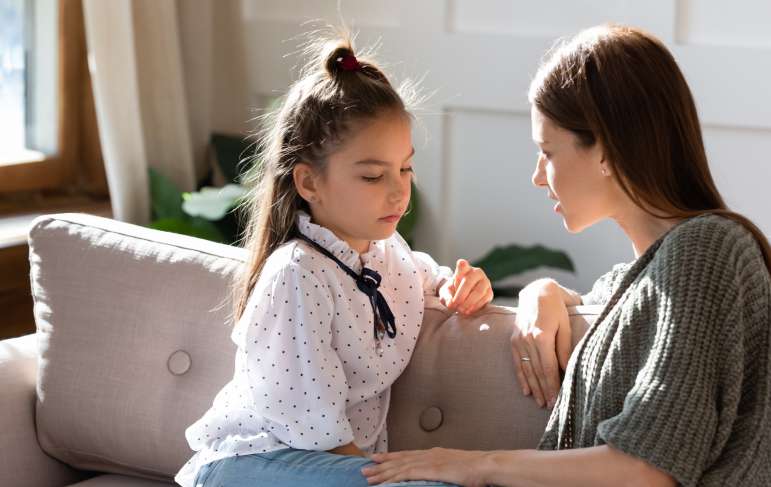When going through a divorce as a parent, figuring out what to say to your children can be the hardest part. If you’re at a loss where to start, keep this simple rule of thumb in mind: good parenting and minimal exposure to conflict can help kids of any age adjust after divorce. While it’s not always possible to fully shield children from conflict, there are appropriate ways to approach the topic that will help them understand the situation. Parents often find it helps to plan what to tell their children – and not tell them – while anticipating the types of questions and emotions that may follow.
Stay Focused on Their Best Interests
When explaining to your kids why you’re getting divorced, it’s usually best to stick with something neutral and brief. Complaints about your soon-to-be-ex are better left for a close friend. However, keep in mind that the topic will come up in multiple conversations, and their questions and feelings about it might vary. Keeping the lines of communication open and focusing on your children’s best interests will help them adjust to their new situation.
A few points can be your guide when talking to a child of any age:
- The divorce isn’t their fault and has nothing to do with them.
- Neither parent should be blamed or criticized.
- You’re there for them if they want to talk.
Invite Questions – Within Limits
If you’re feeling unsure of what to say to your kids, there are certain topics of conversation that are typically safe and healthy to address – and others that are better left unsaid. It’s fine and even necessary to discuss any new living arrangements, for example. And their feelings about the news is one of the most important things you should talk about. But avoid burdening them with details about child support, spousal maintenance, and terms of disagreement or tension.
Your children will likely have some questions, and it’s ok if you don’t have all the answers quite yet. This conversation is just the first, and it will unfold in many ways over time. Let them know that they can ask questions or bring up concerns they have while steering them away from the legal and financial issues as you move through your divorce proceedings.
Adjust Your Message Based on Age
The message you give your child about your divorce may depend on many factors, including their age and developmental stage. After all, children are often very emotional or confused about the idea of their parents splitting up. What a mother tells her 2-year-old won’t be the same as her conversation with her 15-year-old. Here’s how Today’s Parent magazine breaks the topic down by age group:
Age 1-5: Even very small children will pick up on your changing circumstances, but keep conversations about your divorce simple. Considering young children’s limited abilities to understand the situation, be especially mindful while discussing the causes of divorce and any effects or changes resulting from it. You don’t want them to view your decision to live apart as being connected to them.
During this period, parents can provide a sense of stability by focusing on their young children’s normal routines and limiting the conversation to tangible details such as who will live where. They will likely have questions, but you’re your explanations can be brief and basic.
Age 6-11: As kids get older, they’ll have more ability to discuss the matter than their younger siblings. They, too, may need to hear that they didn’t influence your decision to split up. Some kids react with misunderstandings, so be prepared to answer questions and to clear up any misconceptions they have about the causes or consequences.
Kids of this age group may display anger or anxiety. Make sure they know they didn’t influence your decision to help them through the healing process. The older they get the more able they are to express themselves, but that doesn’t mean they will want to talk about it. If this is the case, parents can try a more indirect approach with statements such as, “Some kids feel sad or angry when their parents divorce.”
Age 12-14: As kids get into their teen years, they become increasingly independent. Your home can still be a safe haven for them, even if they’re spending less time there. Even as kids have more activities and freedom, encourage them to reach out to you any time. You might be surprised by their questions and concerns. Be on the alert for warning signs that they’re struggling. Your home can still be a comfortable and familiar refuge, with regular meals, bedtimes, and routines.
Naturally, there is no one-size-fits-all dialog to have with a child, and you know your child more than anyone. Trust your instincts as a parent who cares for your child and wants to protect them from the emotional stress you may be feeling. The information you choose to share with each other will likely evolve in conversations to come.
Contact the Law Office of David A. King, P.C. for help resolving any of your divorce-related matters. Our highly experienced attorneys are knowledgeable and skilled in custody arrangements and will ensure that you’re as prepared as possible in your divorce proceedings.




